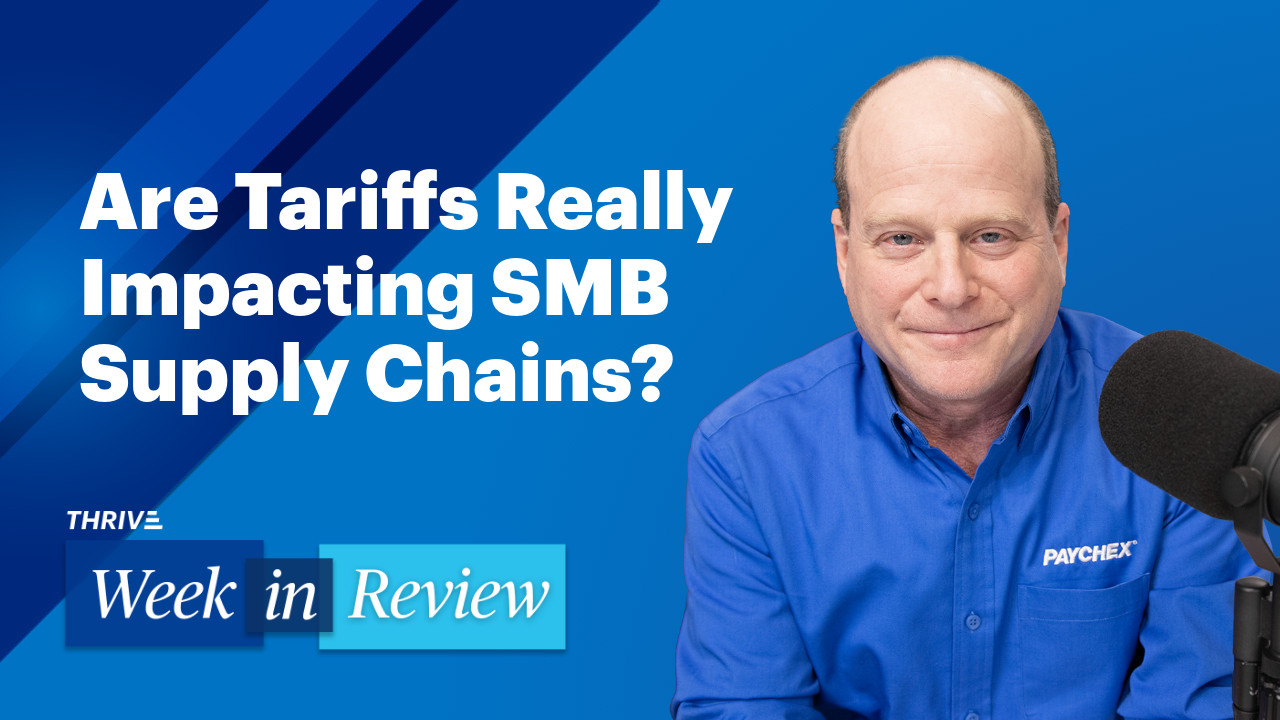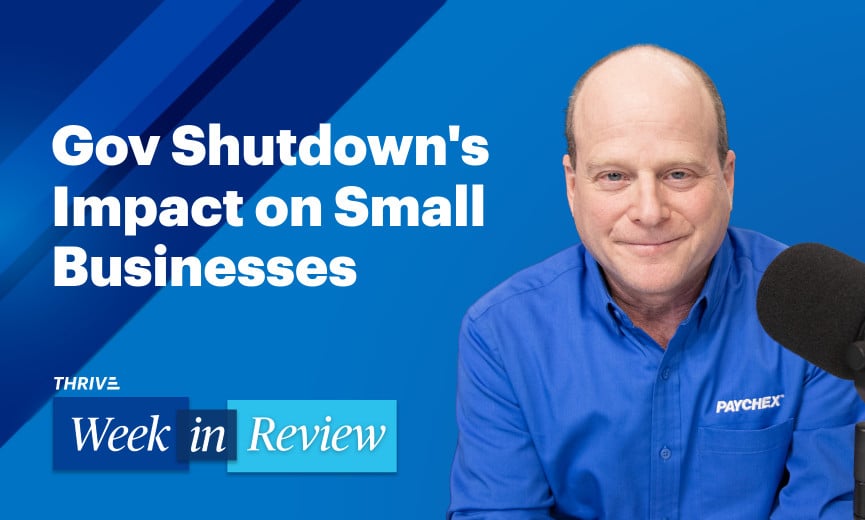- Thrive
-
Temporada
5Episodio40
Cierta permanencia en el paquete de impuestos y gastos beneficiará a las empresas
Podcast •
Vea
Resumen
Businesses should prep for a handful of changes following the signing of the tax and spending package into law. Host Gene Marks highlights some of the provisions, including no taxes on tips and overtime for eligible employees, a re-establishing of 100% on bonus depreciation and research and development costs which could leave more money to invest and purchase more equipment and materials, and a tweak to the pass-through deduction for LLCs and S corps. Listen to the podcast.
Otros recursos
Ver transcripción
[Gene Marks, host]
Hey everybody, it's Gene Marks, and welcome to this week's edition of the Paychex THRIVE Week in Review where we take a few items out of the news and we talk about them a little bit.
And hey, big tax and spending bill just passed. How is that going to impact your small business? It's going to impact it in lots of ways. We want to dig into it, but first, let me tell you, in the coming weeks, we're going to be digging into this topic a lot more on this podcast and I'll be moderating two webinars at the end of the month with some tax experts – one designed specifically for CPAs and the other designed for business owners, as well. You can get links to the registration right in the show notes to this podcast.
But let's talk about this tax bill. I mean, how does it impact you as a business owner? I have a number of ways that I think that you need to be aware of and things that you need to be talking about with your accountant. So, let's get into a few of the bigger ones, okay.
First of all, the pass-through deduction. That means that if you are operating a pass-through business like an S corporation or a limited liability company or a partnership, and your income passes through to your individual income statement, well, there's a big deduction that you've been enjoying since 2017 where you can deduct 20 percent of that income before it actually gets taxed.
That deduction was set to expire. It has now been made permanent as part of this new law. So, the pass-through deduction not only continues in permanence – and it stays at 20%, as well. So, that's certainly good news.
Another piece of good news has to do with bonus depreciation, which basically means that you can write off the costs of many of your machinery and equipment, furniture, fixtures, cars, computer hardware, software – 100% in the first year that you buy it and put it into service. Now, that deduction had decreased to 40% in the first year, er, for this year, and also was going to go down to 20% next year.
Now, it's back up to 100% and is for any assets that you purchase; again, qualified machinery, equipment, autos, there's a list of them. But any of these assets that you purchased after Jan. 19 of 2025, you can take a full 100% deduction for them this year as long as you put them into service.
The same goes with Section 179. That's another provision for businesses to take even more deductions on equipment and other qualified assets that they purchase. That has been restored, up to about $2.5 million dollars that you can take during the first year when you buy and put into service some of those pieces of equipment.
So again, if you're planning on any capital expenditures or if you're in the business of selling these kinds of capital items: again, computer hardware, software, equipment, great, great opportunity to make sure that your customers know that there's now more tax incentives to buy them.
Next is research and development costs. Back in 2022, the ability to deduct fully those research and development costs in the first year went away, which means if you incurred any research and development costs; and this is like materials, outside contractors, internal employees, market research studies, anything that's being used to create new products or services. Well, you could only deduct 20% of that in the first year and then amortize it over the remaining four years.
Now, with this new tax legislation, you can deduct 100% of it right in the first year, and that's been made permanent, as well.
Also permanent is the exclusion for estate taxes – for federal estate taxes – has been made permanent at a level of about $15 million for an individual starting next year and up to $30 million for those filing jointly before Fed estate taxes kick in. So, what does this mean? It means that if you have an estate more than or less than $30 million and you file jointly, you will not have to pay any federal estate taxes. Remember that federal estate tax rate is 40% on the value of your estate. So, in this case, you would not have to pay those taxes at all as long as they're under that exemption amount.
So, because that's also been made permanent, I believe that is going to make it a lot easier for businesses to make some long-term decisions about whether or not they're going to sell or acquire a new business, as well, from an existing owner.
So, again, the estate tax exemption has been made permanent at about $15 million for individuals and $30 million for those filing jointly. And that goes, although it's over $13 million this year, the $15 million number goes into effect in 2026. That's also really good stuff.
Okay, there's been a lot talked about overtime and tips, no taxes on tips. And I want to make sure that we're clear on this. The overtime portion of this will exclude about $12,500 for an individual from paying taxes on their overtime wages. For those that are in receiving tips, the first $25,000 would be excluded from their tipped income.
Now, there's some limitations to this; the tipped workers still need to be defined, some of the details need to be worked out. But, for one, I think that indirectly helps business owners because more workers can be encouraged to work overtime if they know they're not going to be taxed on their overtime wages. So, that's good news. For tipped workers, you know, knowing that they won't get taxed on tipped earnings I think will encourage more people to give tips, which is good, and I think that takes a little pressure off us as business owners from a compensation standpoint.
So indirectly, I think that legislation, that parts of the legislation will benefit small business owners.
In addition, a few other things that you should just be aware of. There are now big deductions for business owners that are building certain types of manufacturing facilities. So, if you are in the business of manufacturing and you're looking to acquire and then build a property or build something from scratch, talk to your accountant because there are significant deductions now available for you to write off the cost of building these manufacturing facilities for your business. So, keep that in mind.
Also, for those of you that contribute to your 529 plans; those are the plans where you put money that is after tax, it goes into a savings account, and then it grows tax-free, and then you don't pay any taxes or penalties if you withdraw those funds in the future as long as they're used for education – like higher education and private school and religious school and costs associated with that.
Well, a little change was made to that in this legislation that now allows people to put money away, have it grow tax-free, pull it out without any penalties or pay no taxes at all if it's used for what's called qualified post-secondary credentialing expenses. This means that if you have workers or if you're a freelancer or an independent person and you want to get certifications – maybe an HVAC certification or certification in contracting or manufacturing or marketing, any kind of specialties that's a certification for your profession or your job, now you're allowed to put money away after tax into a 529 plan, have a grow tax free and then use it in the future to pay for those expenses. So, that's also a really, really good thing.
Finally, there's paid family and medical leave credit. This credit has been in existence for a while and not a lot of business owners know about it. But the bottom line is that if you're a small business and you help pay, you pay people when they take time off for family and medical leave, you can get a credit for the payments that you're making – a percentage of the payments that you're making – against your taxes.
It's sort of the federal government way of way of saying to you, hey, you know, you're not required to make payments, you know, if somebody's off on family medical leave, but if you do, we'll help you out by making those payments. So, that's been around for a while. This time it's been made permanent, so it's not going away.
And listen, I know there are pros and cons to any bill. I know there were some issues with this bill, as well. That's another topic we can take up for another day. But these are all things you should be talking about with your accountant now.
I've been telling my clients to hold off, hold off until all the smoke clears and things are settled. Well, this bill was signed into law on July 4, so it is now settled. Meet with your accountant now and make your tax plans, and those plans looks like because the permanence of some of these things can go well beyond 2025. So, keep that in mind when you're talking to your accountant.
My name is Gene Marks, and you have been watching or listening to this week's episode of the Paychex THRIVE Week in Review. Again, we dug into a little bit on taxes. We're going to be digging into it more in future episodes of this podcast, and don't miss two webinars that we're doing at the end of July that will dig into it. I will be moderating the conversation with some tax experts, one for CPAs, one for business owners. The links are in the show notes.
Hope you got some good information out of this episode. By all means, if you want more help or advice in running your business, get Paychex newsletter or THRIVE newsletter. Go to paychex.com/thrive. You'll get all the information you need to help you run your business as well as the links to prior episodes of this podcast.
Again, my name is Gene Marks. Thanks so much for watching or listening. We'll see you again next week.
Do you have a topic or a guest you’d like to hear on THRIVE. Visit payx.me/thrivetopics and send us your ideas or matters of interest. Also, if your business is looking to simplify your HR, payroll, benefits or insurance services, see how Paychex can help. Visit the resource hub at paychex.com/worx. That’s W-O-R-X. Paychex can help manage those complexities while you focus on all the ways you want your business to thrive.
I'm your host, Gene Marks, and thanks for joining us.
This podcast is property of Paychex, Incorporated, 2025. All rights reserved.

 Apple Podcast
Apple Podcast Spotify
Spotify iHeartRadio
iHeartRadio









